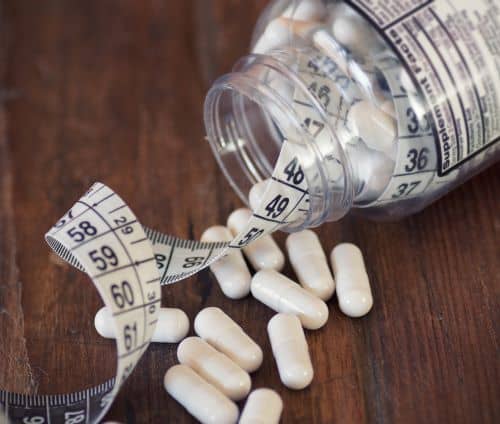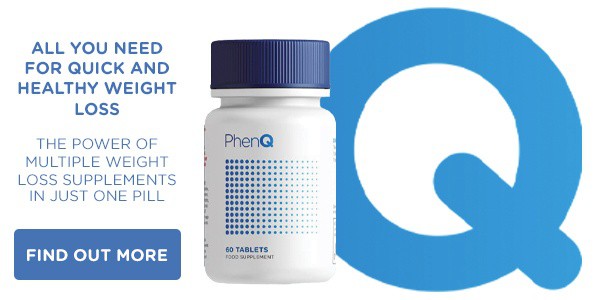Can PhenQ Cause Depression? (Medical Evidence Suggests Otherwise)
Max Health Living is a reader-supported site. Purchases made through links may earn a commission. Learn more.
Studies suggest that obese individuals are at a 2.5 times higher risk of experiencing depression than those who have a balanced BMI.
And what is more ironic is that some weight loss aids may put flame to the fire and potentially worsen your mental health.
Still yet, take a sigh of relief because, unlike other pills, you do not need to be skeptical about PhenQ as it does not cause depression or worsen it.
Want to know why? Here are some key points to give you a quick insight into how PhenQ correlates with depression.
Key Points:
- PhenQ has ingredients that prevent and cure depression instead of causing it.
- The caffeine in PhenQ boosts mood.
- The chromium and α- LACY’s RESET in PhenQ prompt the release of the ‘happy hormone.’
- The nopal fiber enacts the saying ‘happy gut happy mind’.
- Find more about PhenQ on its official website (for Best Price).
But you may still be curious about why other fat burners may negatively impact mental health or if it is suitable to take PhenQ with antidepressants, and rightly so.
No worries, though. This article contains all you need to know on the topic. So continue reading!
Can Fat Burners Cause Depression?

Yes, some fat burners, especially those that act directly on the central nervous system, may cause psychological side effects like depression.
Before you dig in, remember that all weight loss pills, including FDA-approved weight loss drugs as well as over-the-counter diet pills, target fat in unique ways.
So don’t get confused if you find me discussing the depression-causing potential of pills being referred to as appetite suppressants, anorectics, etc.
Diet Pills With A Stimulant Action May Cause Depression
I found an early publication that stated major depressive episodes are more commonly affiliated with diet pills that mess with your brain’s neurotransmitters.
This paper specifically puts the blame on phenylethylamine agents possessing psychostimulant properties, non-phenylethylamine psychostimulants, and serotonergic agents.
Here, the phenylethylamine agents, widely known as sympathomimetic amines, possess noradrenergic activity (stimulate nor-adrenaline release), and an example of such a drug is Phentermine.
Similarly, non-phenylethylamine psychostimulants also trigger nor-adrenaline release, and caffeine falls in this category.
Lastly, serotonergic agents induce serotonin release in the brain, and such an action is exhibited by fenfluramine in the Phentermine-Fenfluramine combination drug.
Depression May Occur As A Side-Effect Of Anti-Obesity Drugs
The National Health and Nutrition Examination Survey (NHANES) highlighted a significant association between the use of non-prescription diet pills and depression.
This link is further exemplified by the case of Rimonabant, an anorectic drug that was officially withdrawn from European markets in 2009.
The reason was that there were multiple reports that suggested that it is causing depression and suicidality in users.
Depression May Occur As A Withdrawal Symptom Of Anti-Obesity Drugs
In some cases, depression is commonly observed as a withdrawal symptom in individuals using appetite suppressants.
The generic names of such pills are phentermine, phenmetrazine, Louria, and diethylpropion.
To delve deeper into the mechanisms and real-life instances of appetite suppressants causing depression, check out my detailed post here.
Diet Pills ‘For’ Depression
There are certain diet pills that possess inherent antidepressant properties.
In fact, some antidepressants are even repurposed for the treatment of obesity.
An example is the FDA-approved drug Contrave (bupropion and naltrexone), which contains bupropion, which is an antidepressant medicine.
However, such drugs can only be obtained with a prescription and pose serious side effects.
In this case, PhenQ is a safer and readily available alternative.
Therefore, in the next section, I will discuss the relationship between PhenQ’s ingredients and depression in detail.
Can PhenQ Cause Depression?

As opposed to most diet pills, PhenQ does not cause depression; instead, it ameliorates it.
This effect may be attributed to its components like caffeine, L-carnitine, chromium picolinate, and α- Lacy’s reset.
So, here is the scientific evidence to back the anti-depressive action of PhenQ
Caffeine May Lower The Risk Of Depression By As Much As One-Third
The PhenQ pills hit you with 150 mg of caffeine per day which positively impacts your mood.
Studies suggest that caffeine attenuates major depressive disorder by mediating the release of dopamine (the feel-good hormone) and by exerting a neuroprotective effect on the brain.
Correspondingly, the results of the fifth Korean National Health and Nutrition Examination Survey showed that individuals who drank at least 2 cups of coffee daily (approximately equal to 196.8 mg caffeine) experienced a 32% lower incidence of self-reported depression than non-coffee drinkers.
Similarly, in another study, researchers overviewed 11 observation articles and suggested that higher caffeine consumption decreases the prevalence of depression.
To be precise, researchers noted a significant impact due to caffeine consumption of more than 68 mg/day and below 509 mg/day (less than 6 cups).
Other studies confirm that a minimum of one cup of coffee (equal to 98.4 mg caffeine) has protective effects against depression, whereas a higher caffeine consumption was linked to causing anxiety and psychosis.
Despite this, the role of caffeine in mediating the development of depression cannot be disregarded completely.
But you don’t need to be worried about it because the antidepressant effect of other PhenQ ingredients is most probably going to nullify it.
Carnitine Deficiency Is Linked to Depression
You get 300 mg of L-carnitine daily with a PhenQ dosage regime, which helps optimize brain functioning.
The L-carnitine in PhenQ may help keep depression at bay by increasing the brain’s energy production, enhancing neuroplasticity, and regulating neurotransmitters.
Here neuroplasticity refers to the ability of the brain’s neural networks to adapt to changes and growth.
This link is indicated in multiple studies in which depression patients were deficient in carnitine levels as compared to normal participants.
Further evidence can be fetched from a study in which depressed renal dialysis patients were supplemented with carnitine daily for three months.
Over time, as the carnitine levels improved, individuals experienced a significant alleviation of their depressive symptoms which was also evident from their decreasing self-rating depression scale (SDS) scores.
Chromium Picolinate May Help Manage Some Depressive Symptoms
By taking two PhenQ pills daily, you will get 40 mcg of trace mineral chromium.
Chromium exhibits an antidepressant activity by raising the norepinephrine levels; low levels may cause depression.
Plus, it enhances insulin utilization which leads to an increase in the tryptophan availability in the central nervous system, which acts as the precursor of the ‘happy hormone’ serotonin.
Correspondingly, researchers conducted multiple studies in which it was revealed that chromium supplementation improves mood and depressive symptoms like increased appetite, binge eating, carbohydrate craving, and loss of libido.
Nopal Fiber Re-Stabilizes The Gut Microbiota, Which May Relieve Depression
A single pill of PhenQ contains 20 mg of nopal, a fiber-rich vegetable that is good for the gut.
With the discovery of the gut-brain axis, the scientific community is now more focused on availing the gut microbiota-driven healing of the body and brain.
Hence, the prebiotic fiber in the nopal plays a crucial role in nourishing gut-friendly microbes.
The microbiota, in turn, helps to reduce inflammation and mediate the production of brain neurotransmitters such as norepinephrine, serotonin, and tryptophan, all of which contribute to a better mood.
It is worth noting that we humans cannot synthesize tryptophan (the precursor of serotonin) ourselves and can only obtain it from the diet, or our gut bacteria produce it for us.
In a 2021 meta-analysis, researchers put nine articles through statistical analysis and established an inverse relationship between depression and fiber intake.
To be precise, they stated that for every 100-gram increase in fiber consumption (through fruits and vegetables), the risk of depression decreases by 3%, and the odds decrease by 5%.
The α-LACY’S RESET Exerts A Serotonergic Activity That Improves Depression
The patented proprietary blend α-LACY’S RESET in PhenQ contains a powerful ingredient called alpha-lipoic acid (ALA) which is known for its antidepressant properties.
Similar to chromium, this alpha-lipoic acid (ALA) attenuates depressive symptoms by enhancing insulin activity which in turn increases the influx of tryptophan in the brain.
And as mentioned previously, this tryptophan influx is crucial in facilitating serotonin production.
This potential was proven in a 2021 study in which 148 diabetic patients were fed ALA for four and eight months.
As a result, the depression score of the participants was reduced by 22.7% after four months, whereas a more significant 38.7% reduction was observed after eight months.
Can You Take PhenQ With Antidepressants?
No, it is better to avoid PhenQ with antidepressants, especially those that are selective serotonin inhibitors (SSRIs).
There are two ways in which antidepressants may interact with PhenQ, they may interfere with its working, or they may exert a collective effect on mood enhancement.
Nonetheless, in both cases, the risk of side effects of each drug is amplified a great deal.
Apart from that, this combination may pose a higher risk of development of serotonin syndrome.
But this is not all that there is to know, so head to my detailed post where I have discussed (under the light of medical evidence) if you can take PhenQ with anti-depressants for elaborate information on this topic and much more targeted content.
Important Disclaimer: The information contained on MAX HEALTH LIVING is intended for informational and educational purposes only. Any statements made on this website have not been evaluated by the FDA and any information or products discussed are not intended to diagnose, cure, treat, or prevent any disease or illness. Please consult a healthcare practitioner before making changes to your diet or taking supplements that may interfere with medications.
Who We Are

We are a team of fitness, health, and supplement experts, and content creators. Over the past 4 years, we have spent over 123,000 hours researching food supplements, meal shakes, weight loss, and healthy living. Our aim is to educate people about their effects, benefits, and how to achieve a maximum healthy lifestyle. Read more.




